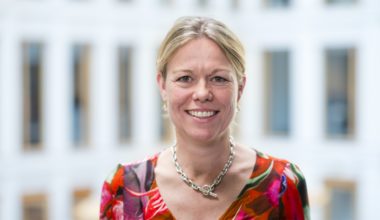As part of our exclusive series in partnership with TOC Digital, INFORM’s Matthew Wittemeier caught up with Marcin Kamola, Communications and Sales Support Manager at DCT Gdańsk, to dig into his background on the terminal operations side of maritime and on what it was like being an “old” millennial in maritime. Working in a company that has challenged the status quo and now becoming senior manager responsible for multiple teams, Marcin opens up about what it’s like to change an industry. This article is a teaser of what we can expect to explore in the upcoming TOC Digital Millennials in Maritime People session (#MiM20People).

MK: Hello, this is Marcin Kamola. I’ve worked for DCT Gdańsk for the last eight years. I’m responsible for several fields here at DCT, including promotion marketing, business development, and customer service. That means I work with three teams. I started as an intermodal development specialist, but with my background in the rail industry and also in media, I expanded my knowledge base and skill level a lot, and now I’m overseeing a large spectrum of relations with our customers, including addressing the turnover.
MW: You would typify yourself as a millennial, correct?
MK: Yeah. My year of birth is 1983. I’m a millennial.
MW: Obviously, we’re here to talk about millennials, but before we dig into a couple of those questions, I’m curious to know: what keeps you coming to work today, eight years on?
MK: Logistics. I know we work in the port, but the terminal is the heart of the modern supply chain. With hundreds of companies and thousands of types of goods, we are networking Poland to the whole world, all in one place. You could say that working in a container terminal is something very easy. You could believe we are just moving containers, shifting them from one mode of transport to another, but every day is different.
The thing that is driving me to come to the office every day is that DCT is just like a start-up. We started about 15 years ago with some ideas, ideas completely opposite to what was the norm in the shipping industry at the time. Ideas, like big vessels, should come to big ports in the Baltic. It’s been a great journey working in a start-up that became part of the Polish infrastructure, and that infrastructure is now a mature business. This business is developing faster than we could have ever expected. We see the big picture, or view operations from a very wide perspective, as we like to say. Add to this that it is nice to have a place to work that is influencing the world of logistics, actually changing it, and meeting hundreds of people, attracting them, who come to Gdańsk. It’s just a fun place.
MW: Absolutely. You mentioned you’ve been with DCT Gdańsk now for eight years. What was it like when you started there? What was the team like? Was it predominantly millennials, or was it older individuals?
MK: When I came to this company, it was 2012, and the average age of the people working in the company was 25 years old. I was then in my late 20s. I was one of the oldest people in the company. It was completely different from the place where I worked before. There, I was the youngest, and now I was one of the oldest, but still not even in my 30s. While we were all young, we had a group of experienced mentors who were guiding us in the idea of the DCT and telling us how to do it in the proper way. I’m 36 now, but I still feel that we are a young company. Of course, there is a new generation of “young” people on my team. There are people who are in their 20s. So, that’s quite a different type of thinking, of course, and sometimes now I feel old.
MW: You mentioned mentors. Were those mentors in your same age category, or were they more experienced and older?
MK: There were two types of mentors. First, there were people that were, I would say, in their 60s, near retirement, with a history of working for the terminals or in shipping not only in Poland but also all around the world. And then there was a second group of managers that were not much older than I was, but were already very experienced working in the industry, say for 10 years. So, also in the positions that were very – how should I describe it? – very much working directly with the customer, and they knew the industry very well. Now, after all these years, some of the older mentors went on through retirement. They went home, some of them to Australia, some of them to the United Kingdom, and some of them stayed in Poland.
The younger mentors are still here as our directors, but now most of us have quite a lot of experience here also. As a result, we are also now trying to follow this mentoring idea that new people come, and we try not to be such strict managers. We would rather be their mentors because I know that sometime in the future, I might leave this company. And if I do, I would like to have someone that stays here and follows my ideas.
MW: What’s important to you in your job?
MK: That’s the first question you get when you would like to apply to work in the company, but of course, beyond having a place where you earn money and you have something for your family, I like the places where I feel that I’m excited about what I’m doing. And when I was telling people that I’m going to work in the port, they said, “Whoa, guy, what’s exciting about that? You’re working in the port, right? And you just see the sea all the time, or you see the vessels.”
To them, I would reply, “No, it’s exciting that you are part of the entire project, that you are building something. You work in a company that is always one step ahead of you, and you know if you want to stay here, you need to develop.”
MW: We’re coming up to the end of our interview, so it’s time for closing thoughts. If you could pass on one piece of advice to the older generation that, while it doesn’t sound like they are likely to be at the helm of DCT Gdańsk, they are typically at the helm of most maritime organizations, ports, terminals, shippers, etc., what would that piece of advice be?
MK: The maritime industry is one of the oldest in the world. People were traveling and trying to go out to sea as soon as they understood how to construct a boat and float. It’s said that maritime business is a conservative business, but we always try to perceive it as the opposite. Maybe because at DCT we are young and we understand that it’s a young industry. I’m working in a container terminal business that is fairly young, just 60 years old. If I would like to say something to the older generation, it would be that you can be sure that we will follow your best ideas, but we will completely abandon the worst ones.
MW: A gem, no doubt. Thank you so much for your time, Marcin.
MK: Thank you very much.
Who is Marcin Kamola?
Marcin works at DCT Gdańsk as communications and sales support manager. Marcin and his teams are responsible for business development, customer service, communication, marketing, and promotion. He has been associated with the transport industry since 2007, including working for DCT since 2012. He is involved in the construction of logistics solutions for clients of DCT Gdańsk in Poland, CEE, and China. Marcin is a graduate of the University of Warsaw and the University of Gdańsk and a guest lecturer at WSB University in Gdansk.
What is #MiM20People?
Building on the successes from the 2019 Millennials in Maritime (MiM19) panel, we’re back this year with an in-depth and focused look at millennials’ take on working in maritime. This is a must-attend session for any company looking to hire, integrate, and retain millennials on their teams.
To explore this topic, INFORM, in partnership with TOC Digital, has put together a multifaceted, multigender millennial panel to weigh in on the social issues of today and debate the millennials’ view of tomorrow. In short, millennials are now a central part of the world’s workforce, and their approach to work and broader social issues will define how companies act in the coming decade.


